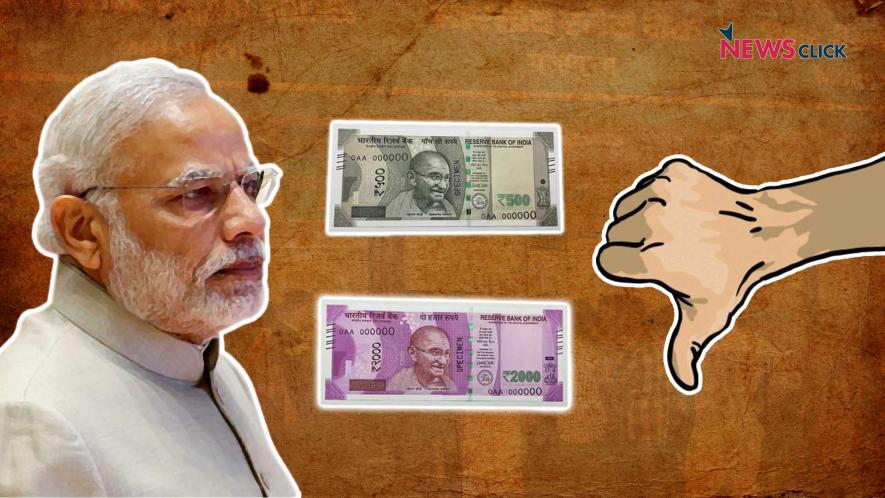Thomas Isaac and Prabhat Patnaik Among the Earliest to Call Note Ban Bluff

Newsclick Image by Nitesh Kumar
Now that official figures from the RBI’s Annual Report have conclusively demonstrated that demonetisation was a complete disaster, some of the earliest reactions by economists whose analysis and predictions turned out to be fairly accurate are coming back into focus. Prominent among them are former JNU professor Prabhat Patnaik and Kerala’s Finance Minister T.M. Thomas Isaac.
Prime Minister Narendra Modi had appeared on national television at 8 pm on 8 November 2016 to announce the decision to withdraw Rs. 500 and Rs. 1000 notes from circulation.
The decision came so much out of the blue that the initial reactions of most economists and political observers were relatively muted. There were a few economists who welcomed the decision with enthusiasm, others who welcomed it with caution, and yet others who expressed the apprehension that the note ban might not fulfill the stated objectives of curbing black economy, terrorism and so on.
But the reactions of a few stood out in their incisive criticism of demonetisation right at the outset.
Dr. T.M. Thomas Isaac, the Finance Minister of Kerala, came out with a response within two hours after Modi’s speech, while eminent economist Prabhat Patnaik reacted with a sharply critical article the very next day.
“PM Modi says in his speech that the [demonetisation] measure is intended to catch fake notes from Pakistan. Would any of the fake notes have “escaped” if two weeks of time were given to the people? The fake notes can be caught when people come to the bank for new notes. No extra fake note is going to be caught just because currency notes were withdrawn at midnight”, wrote Isaac, a trained economist who completed his Ph.D. from the Centre for Development Studies, Thiruvananthapuram.
“The Prime Minister is under the misconception that all black money is kept in sacks as currency notes. A large part of black money is abroad. The central government itself has kept the option open to bring black money back to Indian banks through the Mauritius route, even if 500 and 1000 rupee notes are withdrawn. Those who keep black money in India mostly invest it in gold or land. This black money cannot be detected by withdrawing notes. Then why this drama? That can be clearly understood once we read Prime Minister Modi’s speech. The aim is to shock people. Just a trick to recover from the embarrassment of the promise to deposit Rs 15 lakh each into each Indian’s account by bringing back black money from abroad. That’s all.”
Dr. Isaac also warned that the economy would grind to a halt. However, things might be back to normal in a few days, although it would take more days to overcome the setback, he said. But he soon modified his view regarding the possibility of a quick recovery. In another Facebook post on 13 November he wrote, “Even I didn’t expect can this would be so horrible. There is anarchy all around. Much of the work has stopped because there is no money to give wages. Workers are on the verge of starvation because they are not getting jobs.”
Isaac’s posts went viral, with the first one getting more than 20,000 likes and more than 8600 shares, and the one on 13 November garnering more than 26,000 likes and 11,300 shares. However, a large number of comments, especially below the first post, were critical of Isaac’s remarks. Many said that while they are usually supportive of Isaac, on this issue they couldn’t, clearly showing that a significant number of people were indeed taken in by the shock-and-awe tactic of demonetisation.
Prabhat Patnaik, Professor Emeritus at the Centre for Economic Studies and Planning (CESP) at Jawaharlal Nehru University (JNU), unleashed a blistering attack on the note ban measures, with an article on 9 November titled “Witless and Anti-People”.
"The argument that demonetisation of 500 and 1000 rupee notes constitutes an attack on "black money" is based on an utter lack of understanding of the nature of "black money", a conception of it that is staggering in its simple-mindedness", he argued.
The understanding that "black money" consists of hoards of cash which are held in trunks or pillowcases or buried under the earth is flawed. Even if black money actually consists of cash hoards, those with such cash hoards would send several people to the bank, each carrying a small amount over a number of days prior to the deadline to get the notes exchanged.
Even this prolonged effort would be unnecessary since all sorts of intermediaries would come up soon who would do this job of exchanging old notes on behalf of customers for a commission.
The essence of unearthing "black money" lies in tracking down undeclared activities, and not in attacking money-holdings per se.
Patnaik also referred to the fact that a sizeable portion of "black activities" is operated through banks located abroad. "Quite apart from the fact that “black activities” financed through foreign banks will still escape detection in a cashless India, the very idea of a cashless India represents a pipedream of a segment of the elite, which is totally unaware of the difficulty that a common person faces in obtaining a credit card, or even opening a bank account (despite Modi’s loud boasts about expanding people’s bankability)", he said.
Even if the argument that demonetisation can prevent the circulation of fake notes printed across the border is accepted, the introduction of such new notes which supposedly cannot be faked can be done in a gradual and unobtrusive manner, exactly as the introduction of new currency notes in lieu of old ones is routinely effected.
Patnaik went further in a speech delivered in JNU on 12 November, predicting a serious decline in economic growth:
“At one stroke, you have destroyed 12% of the money supply of the economy and 85% of the currency. Taking away this purchasing power immediately implies that it precipitates a recession in the economy, because the vegetable seller who is giving me credit, for instance, on the basis of which I buy my vegetables, himself has to get credit in order to give me credit. Now that is going to dry up in a couple of days’ time, and if it dries up, he is out of his business. So you have now a situation where a very serious recession is going to occur precisely because you suddenly have impounded 12% of the total money supply of the economy, and what is more, this recession would particularly affect the smaller ones, who don’t deal in credit cards, who don’t deal in bank cheques and so on, who actually deal in currency.
The predictions by Isaac and Patnaik were borne out by subsequent developments. Demonetisation crippled agriculture, caused a slowdown in industrial growth, and shattered the livelihoods of millions, especially in the informal economy. The claims about cashless economy and rooting out of terrorism, of course, have fallen flat.
Isaac took to Facebook after the publication of the RBI's Annual Report.
"It is the people with black money who are laughing now. The poor are in tears. Those who waited for money in their Jan Dhan accounts are disappointed. The agitation by debt-ridden farmers is the strongest in BJP-ruled States. Nobody knows when the lakhs of small scale enterprises which had closed down would open. India's GDP growth went down by 2 percent. The economic slowdown cannot be masked by fake numbers any longer”, he wrote.
Prof. Patnaik writes in his latest article on 31 August:
“An enormous shock was administered to the economy for no rhyme or reason. It dealt a heavy blow to the informal economy; it boosted unemployment among the poorest segment of labourers; it caused massive hardships for common people who had to stand in endless queues to get just a fraction of their own earnings that had been deposited with the banks; it caused the deaths of 103 persons; and it led to a net loss of fiscal resources. The excuse for all this, that it would cripple the black economy, was palpably bogus to start with; its bogusness is now exposed by the RBI’s own data."
"Demonetisation will be recorded in history as the biggest man-made economic disaster in post-independence India", said Isaac.
Get the latest reports & analysis with people's perspective on Protests, movements & deep analytical videos, discussions of the current affairs in your Telegram app. Subscribe to NewsClick's Telegram channel & get Real-Time updates on stories, as they get published on our website.























